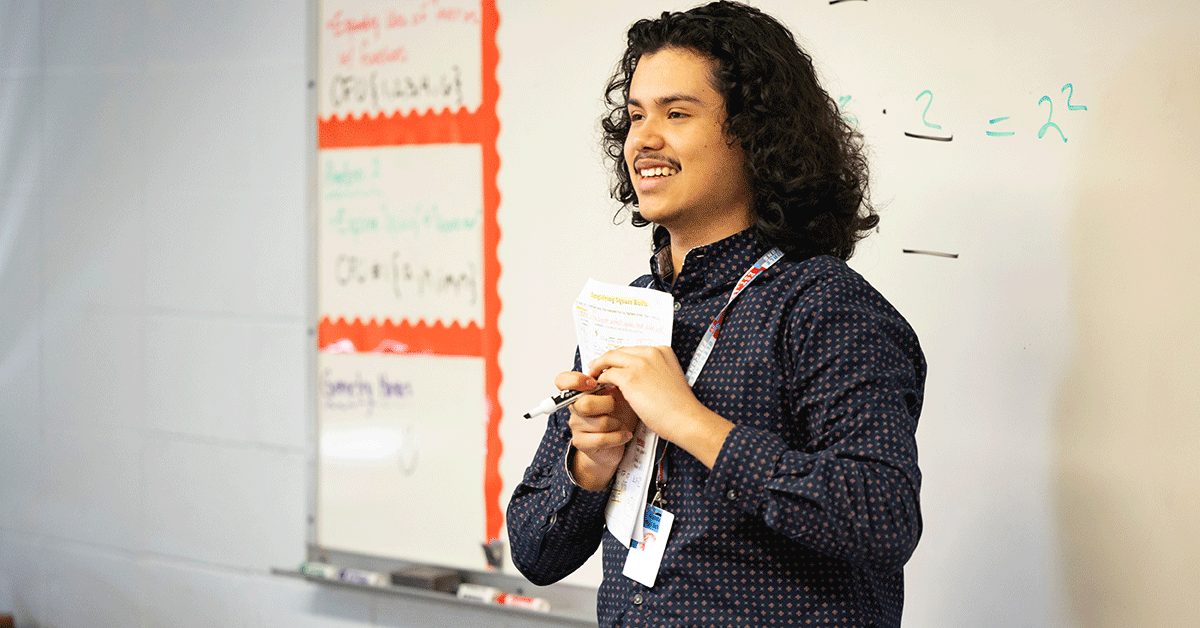Do you struggle with math?
Having a good teacher can make all the difference.
No one knows this better than Joseeduardo Granados Rodriguez, a mathematics education major at Missouri State.
After graduating from Central High School in May 2020, Rodriguez enrolled as an engineering major at North Carolina State University.
When COVID forced the campus to shut down, Rodriguez finished the semester online and returned to Springfield.
“I reevaluated my values, where I stood, and I found myself more interested in, I don’t know, feeling like part of a community,” Rodriguez said.
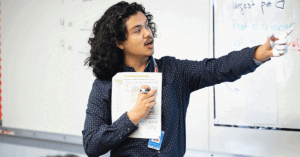
Determining his values
Upon his return to Springfield, Rodriguez’s mentors suggested that he consider a teaching career.
While this sounded good, he remained unsure of his future.
In the spring semester of 2021, he decided transfer to Missouri State, knowing he could save money on his tuition and complete his general education courses while he searched for a career path.
As a first-generation student, Rodriguez knew the value of a quality education.
“My mom really wanted me to be able to pursue that education, and so Missouri State was always an option from the beginning even before I knew what I really wanted to do, just because it was in my hometown,” he said.
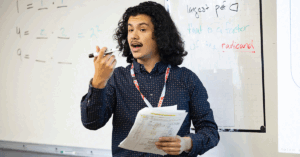
Pattern recognition is a key component of math
Rodriguez was immersed into the world of numbers through many of his family members’ careers in engineering, STEM and math-related fields.
When he was in 6th grade, his teacher encouraged him to participate in a math competition, sparking a newfound passion for mathematics.
Since then, Rodriguez found new ways to make sense of math problems.
“I’ve got ADHD, and so part of ADHD is a lot of pattern-recognizing. And so, when I was younger, my mom always gave me puzzles – the little metal links that would connect and you’re supposed to unlink them. And so, anything that had to do with puzzles or with patterns was a little bit of fun to me,” he said.
“Math is just a series of pattern-recognizing and just relating it to the real world.”
Rodriguez was able to retrain his brain to use math in real-world scenarios.
“Instead of thinking of math as like, ‘Okay here’s the equation; do it,’ I started kind of seeing the parts of the equation, how everything was working and relating it back to something I’d learned before,” Rodriguez said. “Having good teachers to guide me along the way really made it that connection.”
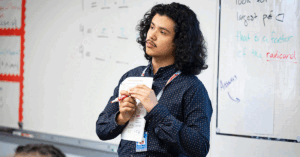
Seeking success in the “ah-ha!” moments
Determined to become a teacher, Rodriguez realized that math was an area of struggle for many students.
“I want for math class to be a place where you feel you belong there and it’s accessible to you.”
While in high school, he tutored his brother and other students. As a tutor, he listened to his peers and used things that interested them, like video games, to make a connection to their math work.
“Whenever I started getting some of those ‘flashbulb’ moments where the student normally does not like math and just doesn’t even like being in the classroom, (they) had a second where it clicked and it made sense,” he said. “They just had that breath of relief, like, ‘I get it!’…That was such a cool moment to see.”
The satisfaction of seeing his students understand the material was a success that fit into his personal life as well.
“It was nice to see relief in somebody who had been so stressed, and that was just kind of a common theme in my life being the translator for my mom and my grandma, helping them out, bring them a sense of relief,” Rodriguez said. “Kind of being someone helping them get to that point felt very validating.”
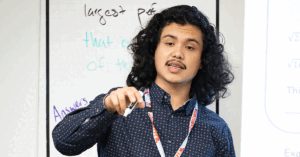
His future is in the numbers
Along with his other mentors, Rodriguez owed his gratitude to several MSU professors in the mathematics department.
He appreciated Dr. Patrick Sullivan‘s commitment to his personal goals.
“Dr. Sullivan was for sure a huge inspiration and a mentor in life in general,” Rodriguez said.
Rodriguez also “felt seen” by Dr. Mark Rogers, who would often go out of his way to make sure his students were succeeding in their studies.
“Dr. Rogers for sure deserves a shoutout. Math education people…you kind of hope and expect that they’ll be supportive, because they’re teachers and such. But Dr. Rogers…his teaching style felt really involved,” Rodriguez said. “He did care about you understanding, not just about doing a routine and getting the answer.”
Rodriguez will graduate with his bachelor’s degree in May 2025.
Coming full circle, he will begin his teaching career next year at his alma mater, Central High School.
Later in his career, he would like to pursue a master’s degree to gain the credentials to teach dual credit.
“For students that hated math before, if I can make it an accessible place, they don’t have to become a mathematician, but now they don’t have to shy away from any other career that requires math,” Rodriguez said.

